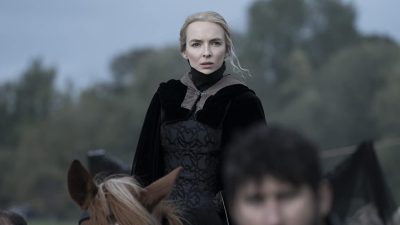

 Counselor.]
Counselor.]
To be fair, the failure of The Last Duel is not all Scott’s fault. There is so much about it that sits largely in Scott’s wheelhouse and he expectedly delivers. It is a big action period piece, set in France in the fourteenth-century, featuring huge battle scenes, with hundreds of extras (and horses) rolling around in the mud, attacking each other with giant swords, blood and testosterone gushing everywhere. It’s got excellent production value, from incredible period costumes (again, for a cast of hundreds) to an insanely detailed production design, and a prop budget that must have broken the bank. There are big stars, too, including Matt Damon, Adam Driver, Ben Affleck and Jodie Comer. And it’s based on the true story of famous French knight Jean de Carrouges (played by Damon), a brave warrior who famously challenged a former friend, Jacques Le Gris (played by Driver) to a duel to the death after de Carrouges’s wife Marguerite (played by Comer), accuses Le Gris of raping her. The 1386 duel became famous for being the last judicial duel allowed by the French king. It’s all very dramatic, and very cinematic.
But films need more than a great story, more than style and production values. A good film starts with a good script. If the script is bad, there is no way to make the film good–no matter who is directing it. And such is the conundrum with The Last Duel, a film that suffers so badly from an overwrought screenplay that, no matter what magic Ridley Scott may still have in him, he just cannot save this from the discount bin of mediocrity.
Ironically, the script comes from three writers who have been lauded for their screenwriting skills, Nicole Holofcener, who was Oscar-nominated for her screenplay for Can You Ever Forgive Me? And Matt Damon and Ben Affleck, who famously won the Oscar for their first-ever produced screenplay, Good Will Hunting, back in 1997. But maybe that’s just the problem. Although Affleck and Damon have gone on to become A-list superstars as actors and each have written screenplays since Good Will Hunting, it has been twenty-five years since they have written anything together, which may have put added pressure on the pair to deliver something significant.
The primary problem with The Last Duel is it has no idea what it is. On its face, it’s an historical period piece with a central character who must take on enemies in order to save his family and his pride. It’s big budget, action-packed, and truly epic in scale. It’s squarely in the Gladiator mold, there is no denying it, and in the moments it resembles Gladiator, The Last Duel is enthralling. But the problem is it is trying to be so much more. Because it is the story of a woman who dares to stand up for herself in a time when women were given only slightly more consideration than animals, The Last Duel turns into a socio-political analysis, a “see how far we haven’t come” statement, heavy-handedly making the point of how long women have been fighting the same battle against oppression and brutality, fighting for their voice to be heard. You can sense Affleck and Damon’s desire to be politically woke, to use this forum to spotlight the emblems of sexism and oppression that still exist today and to magnify the harmful and still-lingering effects of a patriarchy that continues to brutalize and erase women. While it all is very noble, and it’s an interesting true-life story to tell, the message becomes so obvious and heavy-handed, diminishing the desired effect.
To the film’s credit, however, there is a satirical element that underlines the entire film, as our “heroes” are seen through a more honest lens, the battle sequences seen more as violent orgies of testosterone than noble defenses of honor. The societal hierarchy is clearly established, much to its own mockery, as animals and women suffer on the lowest rung, while the higher up you get, the more vile and ridiculous you become. There is much suffering of animals—be warned—which definitely feels purposeful, as animals are shown everywhere as resources and tools, even weapons. Their purposeful placement magnifies the fact that women are often treated no better in this world, the brutality and arrogance of men visited equally upon everything, no matter the species. Testosterone is the main character in The Last Duel, upon which everything springs, through which everything travels and because of which all action is motivated. It is a nice twist on a familiar Hollywood trope, but when the satire pushes too far into the world of political correctness, The Last Duel loses its way.
The narrative structure ends up not working either. We see the same story play out three times, each from a different perspective, which, while might sound great on paper, ends up being wholly ineffective in practice. The audience is forced to watch the same story three times, with hardly enough to separate them to make it worth it. Plus, it means we are forced to watch a brutal sexual assault more than once, the narrative structure making it more difficult to watch each time. Let this be a big warning for anyone who has a trigger for sexual assault—stay far away from this film.
However, with all that said, the one shining light throughout The Last Duel is the performance from Jodie Comer, who is the only one who finds true nuance in the three different tellings of her character’s story. Comer’s Marguerite is the least-drawn character, but still the one we latch onto, the one we care the most about. But the brilliance in Comer’s performance is the fact that she relies on our knowing so little about her, so she gives herself room for texture, variance and doubt in her portrayal. She is fiery and controlled, elegant and impish, vulnerable and confident. If only she were the central character of the film. But of course she’s not. Even in a film about the catastrophe of a male-centered world, the central female character plays a supporting role to the two white men. Some things really never change.
Speaking of the white men at the center of the film, let’s talk a little about Matt Damon. His hair and whatever accent he is doing are both certainly worthy of much mockery. Damon’s performance is not much better, as he stomps and gnarls throughout the film, playing a petulant, self-absorbed man-child with as much grace as a bull in a China shop. Damon has gone over-the-top before, but he’s off the map here. Yes, it is laughable, but not in the way it was intended to be.
Adam Driver, for his part, is surprisingly average. Maybe he’s working so much that he has to phone it in every once in a while, but his performance is middle-of-the-road, uncharacteristic of a performer who is so strong in everything he does. He is absolutely terrifying in the assault scenes, though, his size and presence making for an even more haunting experience.
The one performance that does work is Ben Affleck’s absolutely ridiculously entertaining turn as a cocky, sex-crazed lunatic lord with dyed blonde hair and attitude to match. As if The Last Duel isn’t already confusing enough, between its standard Hollywood macho action movie versus its socio-political statement film, Affleck comes in and turns The Last Duel into a campy romp, playing it up and chewing the scenery, which, I have to admit, I was all in for. It is a much-needed relief in a sea of violence, inhumanity and oppression. It’s nice to see Affleck having fun with it, perhaps poking fun at his own super-serious persona. Whatever the motivation, it works.
But, in the end, The Last Duel ends up suffocating under its own enormous weightiness. There is so much story to tell, it gets lost in itself and never finds its way through its own morass. While it is salvaged by an entertaining performance from Ben Affleck and a searing and indelible one from Jodie Comer, it is unable to get out of its own way. Even Ridley Scott can’t make The Last Duel a winner.
